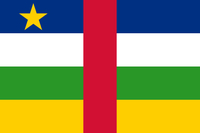Central African Republic
The Central African Republic became independent from France on 1 December 1958.
Independence was followed by mostly military rule and series of coups. In particular Jean-Bedel Bokassa ruled from his coup d'état on 1 January 1966 until 20 September 1979, as President and as self-declared 'Emperor'.
Civilian rule under President Ange-Felix Patasse was established in 1993 and lasted until March 2003.
In March 2003 Patasse was deposed in a military coup led by General Francois Bozizé, who established a transitional government. A new constitution was approved by voters in a referendum held on 5 December 2004.
A wide field of candidates contested the municipal, legislative, and presidential elections held in March and May of 2005 and General Bozizé was affirmed as president. Bozizé and his party both had victories in elections held during 2011.
The militant group the Lord's Resistance Army continues to destabilize southeastern Central African Republic, and several rebel groups joined together in early December 2012 to launch a series of attacks tresulting in their control of numerous towns in the northern and central parts of the country. The rebels participated in peace talks in early January 2013 which resulted in a coalition government including the rebellion's leadership.
In March 2013, the coalition government dissolved, rebels seized the capital, and President Bozizé fled the country. Rebel leader Michel Djotodia assumed the presidency, reappointed Nicolas Tiangaye as Prime Minister, and established a transitional government on 31 March. On 13 April 2013, the National Transitional Council affirmed Djotodia as President.
The Central African Republic has a civil law system based on the French model.

